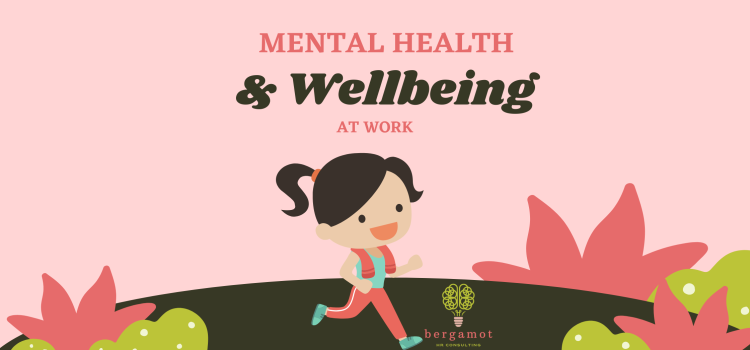
Why is supporting employee's mental health and well-being at work important?
Supporting employees’ mental health and well-being is the right thing to do, isn’t it?
I absolutely believe it is, and increasingly employees are expecting it as part of the employee deal. Recent research by the Executive Development Network found that 86% of employees would leave their jobs if it didn’t support their well-being.
We have emerged from around three years of a pandemic that was traumatic for many and changed so much about the way we worked. As an HR Business Partner during the pandemic, I spent a significant amount of time focusing on how to support employee mental health and well-being. At the same time, Gen Z has been joining the workforce and finding their voice and this is extremely important to them. However, according to TELUS health research, half of 20-29 year old UK workers have expressed concerns that speaking up about a mental health condition could stint their career progress.
Both these factors have had a huge influence on the emphasis that is currently being placed on supporting mental health and well-being. Of course, we should not forget that employers have a legal duty to provide a safe and healthy working environment for their employees and failure to support mental health and well-being could lead to legal issues.
Business leaders and owners understandably need to understand the benefits of investing time and/or money. And it appears many of them have done this. According to the Bupa Global Executive Wellbeing Index, 47% of businesses placed employee mental health and well-being as a top priority. A similar number intend to spend more on this in 2023, and also increase the number of roles with mental health and well-being responsibility.
So what are some of the benefits of prioritising employee mental health and well-being?
🎯 Increased productivity: When employees feel supported and mentally healthy, they are more likely to be productive and engaged in their work.
🎯 Reduced absenteeism and presenteeism: By supporting employees’ mental health and well-being, employers can reduce the number of days that employees take off work due to mental health issues. Additionally, employees who are present but not fully engaged in their work due to mental health issues can be costly for employers.
🎯 Improved employee retention: Employers who prioritise mental health and well-being are more likely to retain employees. This can save employers money on recruitment and training costs.
🎯 Enhanced company culture: By fostering a culture of well-being, employers can create a more positive and supportive work environment. This can lead to increased employee morale, job satisfaction, and loyalty.
🎯 Reduced healthcare costs: When employees are mentally healthy and well, they are less likely to need medical care for mental health issues. This can help employers save money on healthcare costs.
🎯 Improved customer service: Employees who are mentally healthy and engaged in their work are more likely to provide excellent customer service, which can benefit the company’s reputation and bottom line.
🎯 Increased creativity and innovation: When employees are mentally healthy and supported, they are more likely to think creatively and come up with innovative solutions to problems.
However, despite the positive intent of some organisations, another survey by Kooth Work revealed:
⚠️ 60% of employees agree, to some extent, that their mental health is important to their company
⚠️ BUT 82% of employees do not believe enough is being done
⚠️ 40% of employees were unaware of the support available to them
⚠️ Only 43% would choose to access mental wellbeing support at work
⚠️ Only 5% had accessed EAP programmes
What are some of the ways employers can support mental health and well-being at work?
🎯 Create a supportive work culture: Employers can create a culture that prioritises mental health and well-being by openly discussing mental health, providing resources, and promoting self-care.
🎯 Offer employee assistance programs (EAPs): EAPs provide confidential counseling and support services to employees who are experiencing mental health issues.
🎯 Provide mental health benefits: Employers can offer mental health benefits such as counseling, therapy, and psychiatry services to their employees.
🎯 Encourage work-life balance: Employers can encourage work-life balance by offering flexible work arrangements, such as remote/hybrid working or flexible schedules, and ensuring employees are taking their holiday.
🎯 Train managers and supervisors: Managers and supervisors can be trained to recognise signs of mental health issues and provide support and resources to employees who need it. Conservative MP Dean Russell has proposed making it a legal requirement for businesses to offer mental health first aid training, as he believes it could “save lives”.
🎯 Foster social connections: Employers can promote social connections and team-building activities to help employees feel connected and supported.
🎯 Reduce stigma: Employers can reduce stigma surrounding mental health by offering education and training, incorporating mental health into wellness programs, and promoting open communication about mental health in the workplace. However, leadership is key. Leaders and managers need to lead by example, show vulnerability and foster trust and engagement in their teams
Most importantly, employers need to understand what they are trying to solve before they dive into solutions. They should take steps to understand why they are doing something: What problem are they trying to solve? What are they aiming to achieve? And also, it is crucial to involve employees in crafting the solution.
Once the approach to supporting mental health and well-being has been formed, communication is key. People can’t benefit from initiatives if they do not know they exist.
And finally, as with all people policies and practices, the approach should be reviewed regularly to ensure it is up to date, legally compliant and fit for purpose.
Are you losing valuable time or sleep over HR worries?
Get in touch to arrange a no obligation chat to find out how I can help you



